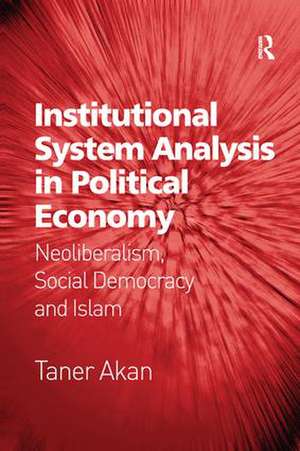Institutional System Analysis in Political Economy: Neoliberalism, Social Democracy and Islam
Autor Taner Akanen Limba Engleză Paperback – 12 oct 2017
| Toate formatele și edițiile | Preț | Express |
|---|---|---|
| Paperback (1) | 102.69 lei 6-8 săpt. | |
| Taylor & Francis – 12 oct 2017 | 102.69 lei 6-8 săpt. | |
| Hardback (1) | 768.46 lei 6-8 săpt. | |
| Taylor & Francis – 28 oct 2015 | 768.46 lei 6-8 săpt. |
Preț: 102.69 lei
Nou
Puncte Express: 154
Preț estimativ în valută:
19.65€ • 20.27$ • 16.40£
19.65€ • 20.27$ • 16.40£
Carte tipărită la comandă
Livrare economică 26 martie-09 aprilie
Preluare comenzi: 021 569.72.76
Specificații
ISBN-13: 9781138559820
ISBN-10: 1138559822
Pagini: 288
Dimensiuni: 156 x 234 x 24 mm
Greutate: 0.45 kg
Ediția:1
Editura: Taylor & Francis
Colecția Routledge
Locul publicării:Oxford, United Kingdom
ISBN-10: 1138559822
Pagini: 288
Dimensiuni: 156 x 234 x 24 mm
Greutate: 0.45 kg
Ediția:1
Editura: Taylor & Francis
Colecția Routledge
Locul publicării:Oxford, United Kingdom
Notă biografică
Taner Akan is an Associate Professor of Political Economy and a visiting scholar at the International Development Institute of the King’s College London. His areas of research cover institutional theory, political economy, and economic governance. He was earlier a research associate at the London School of Economics and a visiting scholar at the Max Planck Institute for the Study of Societies.
Recenzii
’Where is the Turkish political economy going? In an impressive theoretical effort, Taner Akan posits the need and explores the possibilities for a synthesis between Islam, Kemalist social democracy and the neoliberalism of the AKP government. The book combines system theory with a theory of institutional change, in order to understand the history of Turkish society from the Ottoman Empire until today, identifying both impediments and opportunities for capitalist and post-capitalist development.’ Wolfgang Streeck, Max Planck Institute for the Study of Societies, Germany
Cuprins
Introduction. Part I Institutions, Social System and Political Economy: Institutional interactions in an evolutionary system perspective; A systemic and cross-paradigmatic analysis of Islamic, neoliberal and social democratic political economies. Part II Formation and Re-formation of Path-Dependencies among Islam, Secularism and Etatist Liberalism: Primordial path-dependencies: the Ottoman Islamic institutionalism; Burgeoning secular capitalism between changing continuities versus continuing path-dependencies; The embedding of Orthodox Kemalism and etatist liberalism in Analotia between continuing changes and path-dependent discontinuities; The institutional environment and the major actors in the Turkish political economy during the period 1960-2013. Part III Systemic Versus Reconciliative Changes Between Major Paradigms in Modern Turkey, 1960-2013: The floating evolution of Turkish social democracy and Kemalism between Orthodoxy and third way; The Just Order: re-accumulation of discontinuing path-dependencies versus the persistence of path-dependent discontinuities; Conservative democracy as the Second Great Divide [?] in Anatolia at the crossroads of continuing changes and changing discontinuities. Part IV The Future Prospects: Is there a next way for Turkish social democracy?; The political and economic future of the Ottoman-Turkish Islam. Conclusion; References; Index.
Descriere
The enduring debate on institutional pillars of contemporary political economies has gathered a noticeable momentum in terms of the change, path-dependence, and varieties of capitalism. Institutional System Analysis in Political Economy develops an ’interaction-theoretic and evolutionarily-structured approach’ with an aim to better capture the path-dependence and change of political, economic, and cultural action in terms of their intersectional dynamics.
